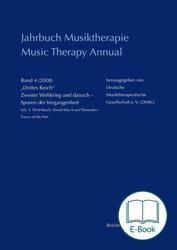Singing: Spirutal Survival and Resistance During the Holocaust.
2009 DOI: https://doi.org/10.29091/9783752001860/004 Page 69 - 98 9783752001860_004.pdf
178.1 KB
9783752001860_004.pdf
178.1 KB
This article deals with Jewish folklore, specifically songs and singing, during the Holocaust. Hundreds of songs composed during this period have survived, songs from Jews throughout Europe. These songs, originating wherever Jews were to be found, regardless of condition or circumstance, and in dozens of languages, were composed at a time of unprecedented violence and murder. A question of upmost importance arises for music therapist: „Why?“ Why songs and singing during a period of time when pure survival was the foremost goal? In seeking an answer to this question, several songs are presented along with the stories associated with them, stories which lend an understanding as to how songs became a venue of communication when and where language had collapsed. The development of songs as a form of written history becomes evident, during the struggle against the eradication of murder. When the spark of humanity and hope had extinguished, songs and singing became an incentive for life. The Jewish voice has never stopped singing but with one exception: during the „Death Marches“. With the liberation of the Displaced Person (DP) camps, singing started again. I believe that as much as the singing of the Jews during the Holocaust was in reaction to an utterly incomprehensible period, it also offers an intriguing perspective for the therapists to understand one of the coping mechanisms that Jewish people developed to psychologically survive such devastation.

